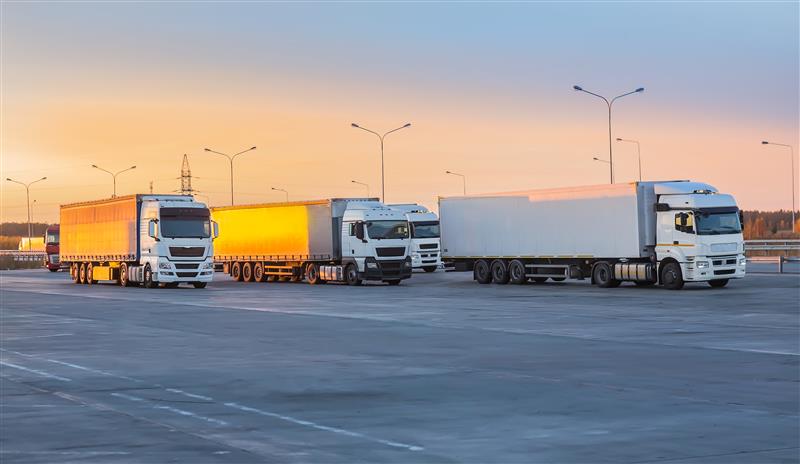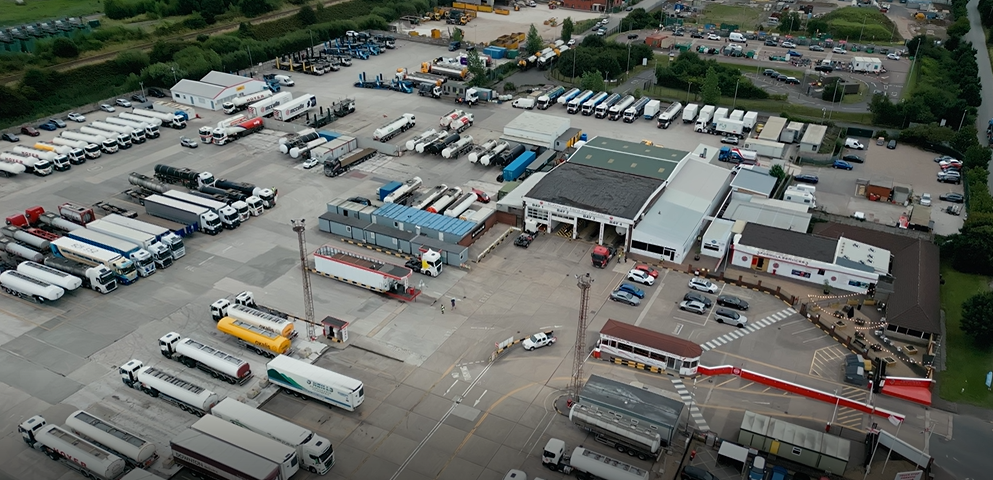
Guest
Dürfen Lastkraftwagen in Europa sonntags fahren?
Erstellt: 23.12.2024
•
Aktualisiert: 23.12.2024
Der Umgang mit Sonntagsfahrverboten für Lkw in Europa erfordert ein umfassendes Verständnis der länderspezifischen Vorschriften, der saisonalen Schwankungen und wirksamer Strategien. Indem sie in eine gründliche Routenplanung investieren, auf dem Laufenden bleiben, den Betrieb optimieren und die Technologie nutzen, können Flottenunternehmen die Auswirkungen dieser Beschränkungen abmildern.
In diesem Blog gehen wir auf die unterschiedlichen Vorschriften in verschiedenen europäischen Ländern ein und erläutern, wie man sich am besten an sie anpasst.
Länderspezifische Vorschriften
Jedes Land hat seine eigenen Gesetze zu Sonntagsfahrverboten, und diese können sehr unterschiedlich sein.
Deutschland
Am letzten Tag der Woche dürfen von 12 bis 22 Uhr keine Lkw mit mehr als 7,5 Tonnen fahren. Dies ist jedoch nicht unbedingt abschreckend. Für den kombinierten Verkehr gibt es Sonderregelungen: Schienen- und Straßenverkehr sind in einem Umkreis von 200 Kilometern um Be- oder Entladestationen erlaubt, Hafen- und Straßenverkehr in einem Umkreis von 150 Kilometern um Häfen. Auch die Beförderung bestimmter verderblicher Waren wie Frischmilch, Molkereiprodukte, Fleisch, Fisch, Obst und Gemüse ist freigestellt.
Darüber hinaus sind bestimmte Fahrzeuge und Tätigkeiten von dem Verbot ausgenommen, z. B. Einsatzfahrzeuge, die an Abschlepp- oder Pannendiensten beteiligt sind.
Frankreich
In diesem Gebiet gelten ähnliche Fahrverbote wie in Deutschland für Lastkraftwagen über 7,5 Tonnen. Diese Sperrungen gelten an Sonn- und Feiertagen von 12 bis 22 Uhr.
Hinzu kommen Beschränkungen an Samstagen und am Tag vor nationalen Feiertagen, an denen das Fahren von 22.00 bis 24.00 Uhr verboten ist. Und im Sommer gibt es an bestimmten Samstagen Fahrverbote von 7 Uhr morgens bis 19 Uhr abends.
Ausnahmen gelten für bestimmte Waren, darunter Milch- und Fleischprodukte, sowie für Einsatzfahrzeuge. Verstöße gegen diese Verbote können zu erheblichen Geldbußen führen, die für Einzelpersonen und Unternehmen zwischen 750 € und 3 750 € liegen.
Italien
In Italien dürfen Lkw an Sonn- und Feiertagen von 9 Uhr morgens bis 22 Uhr abends nicht auf den Straßen unterwegs sein. In den Monaten Juni, Juli, August und September beginnt das Verbot bereits um 7 Uhr morgens, endet aber dennoch um 22 Uhr.
In den Sommermonaten verhängt das Land außerdem zusätzliche Beschränkungen. Im Juli gilt ein Samstagsembargo von 8 Uhr morgens bis 16 Uhr nachmittags, im August von 8 Uhr morgens bis 22 Uhr.
Dies sind zwar die allgemeinen Regeln, aber es ist wichtig zu wissen, dass es lokale Abweichungen oder vorübergehende Einschränkungen auf bestimmten Strecken geben kann. Wie in Frankreich und Deutschland können auch hier Ausnahmen für bestimmte Arten von Gütern oder Notfalldienste gelten.
Spanien
Was Spanien betrifft, so ist das Szenario wesentlich komplexer. Es gibt ein Flickwerk regionaler Verbote, insbesondere in Katalonien. Die Fahrverbote für Lkw können sich je nach örtlichen Vorschriften, Feiertagen und bestimmten Strecken ändern. Lkw-Fahrer, die hier tätig sind, sollten die örtlichen Richtlinien konsultieren, um die Einhaltung zu gewährleisten.
Zusätzlich zu den Sonn- und Feiertagsverboten gibt es in den Sommermonaten auch an bestimmten Samstagen Einschränkungen. Diese gelten in der Regel von 8 bis 12 Uhr, vor allem im Juli und August, wenn das Verkehrsaufkommen aufgrund von Urlaubern höher ist.
Andere Länder
In anderen europäischen Ländern gibt es viele, die ebenfalls ihre eigenen Sonntagsfahrverbote durchsetzen. In Österreich zum Beispiel dürfen Lkw mit einem Gewicht von mehr als 7,5 Tonnen sonntags von 12 bis 22 Uhr nicht auf die Straße. In der Schweiz gilt etwas Ähnliches: Fahrzeuge mit einem Gewicht von mehr als 3,5 Tonnen dürfen den ganzen Tag über nicht fahren.

Strategien für Fuhrparkunternehmen
Um die Sonntagsfahrverbote für Lastkraftwagen zu umgehen, ist eine effektive Routenplanung von entscheidender Bedeutung. Durch den Einsatz moderner Technologie und strategisches Denken können Flottenbetreiber ihre Prozesse optimieren.
GPS und Routenplanungssoftware nutzen
Der Einsatz moderner GPS-Systeme und [Routenplanungssoftware] (https://snapacc.com/newsroom/route-optimisation-with-fleet-management-software-snap-account/) ermöglicht es Fuhrparks und ihren Fahrern, die effizientesten Fahrten zu ermitteln und dabei Gebiete mit Fahrverboten zu vermeiden. Diese Tools bieten Echtzeit-Updates zu den Straßenverhältnissen, so dass die Lkw-Fahrer unterwegs fundierte Entscheidungen treffen können.
Alternative Routen in Betracht ziehen
Eine weitere Idee ist es, verschiedene Wege zu erkunden, um an den betreffenden Ort zu gelangen. Es mag zwar verlockend sein, den direktesten Weg zu nehmen, aber alternative Routen können oft Zeit sparen und mögliche Geldbußen vermeiden. Solche Umwege sind zwar etwas länger, können aber dazu beitragen, Gebiete mit strengen Embargos zu umgehen, was zu einem reibungsloseren Ablauf führt.
Planen Sie für Verzögerungen
In Anbetracht möglicher Rückschläge durch Verkehrsstaus oder Fahrverbote ist es für Fuhrparkunternehmen ratsam, zusätzliche Zeit einzuplanen. Ein proaktiver Ansatz bietet bessere Chancen für pünktliche Lieferungen - selbst bei unerwarteten Herausforderungen.
Bleiben Sie informiert
Genauso wichtig ist es, sich über Vorschriften und Verkehrsbedingungen in Echtzeit auf dem Laufenden zu halten. Deshalb ist es ratsam, spezielle Apps und Websites zu nutzen. Diese bieten Lkw-Fahrern Live-Updates zu Straßensperrungen, Unfällen und Staus, sodass sie ihre Routen anpassen und Verzögerungen vermeiden können.
Viele Verkehrsverbände und Logistikunternehmen bieten Abonnementdienste für Verkehrsmeldungen an. Durch die Anmeldung für diese Benachrichtigungen können Fuhrparkbetreiber Informationen über Änderungen der Fahrregeln erhalten und so sicherstellen, dass sie diese auch einhalten.
Technologie nutzen
Der Einsatz von Technologie kann die betriebliche Effizienz und die Einhaltung der [Lenkzeitvorschriften] (https://snapacc.com/newsroom/drivers-working-time-directive-a-guide-for-truck-drivers/) verbessern.
Telematiksysteme ermöglichen es Fuhrparkunternehmen, den Standort der Fahrzeuge, den Kraftstoffverbrauch und das Verhalten der Fahrer zu überwachen. Die Daten können für die Optimierung der Routen von unschätzbarem Wert sein. Darüber hinaus vereinfacht das Führen digitaler Fahrtenbücher das Führen von Aufzeichnungen, die im Falle eines Audits eine wichtige Dokumentation darstellen.
Genauso wichtig ist die Technologie zur Vereinfachung von Zahlungen - und hier kann SNAP helfen.
Anmeldung bei SNAP
Ganz gleich, ob Sie einen sicheren Parkplatz, eine Lkw-Waschanlage oder andere Dienstleistungen für Ihren Fuhrpark suchen, mit unseren Lösungen wird das Bezahlen für Sie viel bequemer. Schauen Sie sich an, was SNAP Ihnen heute bieten kann.



